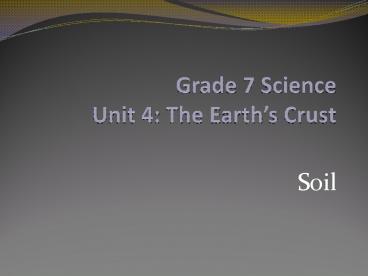Grade 7 Science Unit 4: The Earths Crust - PowerPoint PPT Presentation
1 / 25
Title:
Grade 7 Science Unit 4: The Earths Crust
Description:
Many processes are involved in the formation of soil. ... Organic materials are piled together and under the right conditions will form humus. ... – PowerPoint PPT presentation
Number of Views:181
Avg rating:3.0/5.0
Title: Grade 7 Science Unit 4: The Earths Crust
1
Grade 7 ScienceUnit 4 The Earths Crust
- Soil
2
Soil
- Can take thousands of years to form.
- Many processes are involved in the formation of
soil. - Weathered and eroded rocks form the parent
material of soils.
3
- Organic material from the decomposition of plants
and animals provide the nutrient base for a
variety of soil ecosystems. - Soil develops faster in warm climates.
4
3 Basic Types of Soil
- Clay
- Sand
- Gravel
The above are listed from the smallest to the
largest particle size.
5
Factors that Determine how Soil Develops
- Refer to page 426
6
Porosity vs. Permeability
- Porosity
- Permeability
- The amount of empty space in a soil or rock.
- A measure of the ease with which liquids and
gases pass through a soil or rock.
7
Soil Classification...
- Soil is classified according to their
characteristics. These are usually based on
texture or how they feel.
8
Coarse Texture
- These soils have a sandy/ gravelly texture.
- They feel gritty and can roll between your
fingers. - Grains can be seen with the naked eye.
9
Coarse Soil
Sand/ Gravel
10
Medium Texture
- Also called loam. Farmers preference.
- Composed of sand, silt and clay in nearly equal
proportions. - May feel gritty and sticky at the same time.
11
Medium Grain Soil
- Loam
12
Fine Textured
- Made up of clay.
- Feel greasy or sticky.
- Have little texture when wet.
13
Fine Grain Soil
- Clay
14
Fine
Medium
Coarse
15
Complete Core Lab Activity 12-2B
- Be a Soil Sleuth
16
Fertilizers
- Substances that provide nutrients for plants.
- May contain decomposed plants and animals and
other minerals. - Can have natural or human-made fertilizers.
17
Enriching Soils
- Compost
- Manure
- Chemical fertilizers
Refer to page 435
18
Composting
- The breakdown of plant materials. (decomposition)
- Organic materials are piled together and under
the right conditions will form humus.
19
Good Things to Compost
20
Enriching Soils... Positive effects
- Enhanced plant growth.
- This will decrease erosion, more food and better
looking plants and crops.
21
Negative effects
- Pollution in the form of run-off.
- Phosphate pollution in lakes and ponds may
increase algal blooms. This removes oxygen and
kills aquatic creatures.
22
(No Transcript)
23
- Nitrogen compounds can also pollute water in the
form of run-off.
24
Solutions Refer in pages 437(8)
- Reduced reliance on chemical fertilizers.
- Limiting run-off
- Planting wind breaks
- No-till farming
25
Desertification
- The process in which nutrient depleted soils are
formed through erosion of fertile soil. - Solutions?































